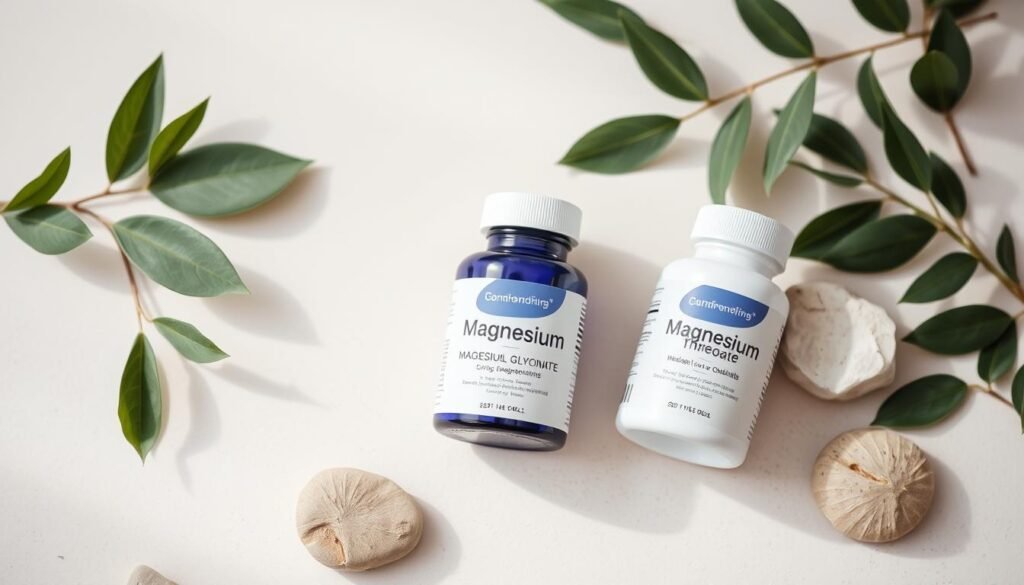Nearly half of those with conditions like type 2 diabetes have low magnesium. This lack is linked to more anxiety and depression. Magnesium supplements, considered the “original chill pill,” can help reduce stress. They offer a peaceful break from our busy lives.
We will look at various magnesium supplements in this article. We’ll see which one is best for easing anxiety. From magnesium glycinate, which is great for relaxation, to other types, learning about magnesium can help you take care of your mental health.
Key Takeaways
- Magnesium plays a key role in managing anxiety and mood disorders.
- Nearly 50% of people with certain metabolic conditions have low magnesium levels.
- Magnesium glycinate is often recommended for its calming properties.
- Daily magnesium intake for anxiety typically ranges from 300-400 mg.
- Magnesium helps increase GABA levels in the brain, promoting relaxation.
- Consistency in magnesium supplementation is crucial for effective results.
- Supplementing with magnesium can enhance sleep quality and reduce insomnia.
Understanding Magnesium and Its Role in Mental Health
Magnesium is key for our mental well-being. It helps with enzyme work and nerve messages in our body. This mineral is important for feeling good and staying calm. Knowing how magnesium helps can show us its value in fighting stress.
The Importance of Magnesium in Biological Functions
Magnesium is crucial for many body processes. It keeps blood pressure normal and boosts the immune system. When we don’t have enough magnesium, our body struggles. A study in 2010 found magnesium could help with anxiety. This shows it’s important for our mental health.
How Magnesium Influences Mood and Anxiety Levels
Magnesium has a big role in managing anxiety. Studies show it can calm the brain. This helps us relax. A comprehensive review in 2017 found magnesium really does lessen anxiety levels. Having enough magnesium makes us feel better and less stressed. So, it’s vital to keep magnesium levels up, especially for mental health.
| Magnesium Supplement Type | Common Uses | Recommended Dosage |
|---|---|---|
| Magnesium Glycinate | Relaxation, sleep aid | 75-360 mg per day |
| Magnesium Oxide | Digestive health, anxiety relief | 75-360 mg per day |
| Magnesium Citrate | Constipation, mood improvement | 75-360 mg per day |
| Magnesium Lactate | Mood enhancement, anxiety treatment | 75-360 mg per day |
| Magnesium Chloride | Hydration, nerve function | 75-360 mg per day |
Knowing about magnesium and its mental health perks is growing. If you’re thinking about supplements for anxiety, talk to a doctor first. Understanding the different types of magnesium helps us make smart health choices.
Magnesium Deficiency and Anxiety: What’s the Connection?
It’s worth knowing how magnesium deficiency links to anxiety for better understanding. Research shows low magnesium levels might make anxiety worse. This concerns about 34% of adults in the U.S. who feel anxious. Recognizing this can help people be aware of their diet’s impact.
Common Symptoms of Magnesium Deficiency
These symptoms can vary, including:
- Fatigue
- Insomnia
- Muscle cramps
- Increased anxiety or irritability
If you notice these signs, you might have magnesium deficiency anxiety. Not getting enough magnesium can increase stress and anxiety.
The Link Between Low Magnesium Levels and Anxiety Disorders
Studies link low magnesium levels to anxiety. Magnesium supplements like glycinate and L-threonate could lower anxiety. If your diet lacks magnesium, these supplements could help.
Farming methods today mean foods have less magnesium. The RDAs recommend 400 mg daily for men and 310 mg for women ages 19 to 30. Many adults don’t get enough magnesium from food. Always talk to a doctor before taking supplements. They can help decide the right amount for you. Learn more about magnesium and anxiety here.
Best Magnesium Supplement for Anxiety: Key Features to Consider
Finding the right magnesium supplement is key for those wanting to manage their anxiety. The best option depends on how the body absorbs magnesium. It also matters how magnesium works with other medications or health conditions.
Bioavailability: Why It Matters
Bioavailability is about how well the body can use magnesium. Various types of magnesium have different absorption rates. Magnesium glycinate is known for being easily absorbed. Choosing a highly bioavailable supplement can make it more effective against anxiety.
Forms of Magnesium and Their Effectiveness
There are many magnesium kinds, each with unique benefits. For instance, magnesium taurate absorbs quickly and may lessen anxiety. Magnesium lactate can also be effective. It’s important to investigate these options to match personal health needs, as effects can change.
Individual Needs: Consulting Healthcare Professionals
It’s crucial to talk to a healthcare professional before taking magnesium, especially if you have certain health conditions or anxiety levels. They can create a plan that fits your health needs and checks for medication interactions. This way, the magnesium supplement can work best for you.
Adding the right magnesium supplement can help with anxiety management. You can find more about magnesium and mental health in this research. Knowing about magnesium’s forms and benefits is a step towards finding anxiety relief.
| Magnesium Form | Bioavailability | Primary Benefits |
|---|---|---|
| Magnesium Glycinate | High | Calming properties, helps with sleep |
| Magnesium Taurate | High | Rapid absorption, reduces anxiety symptoms |
| Magnesium Lactate | Moderate | Minimizes anxiety symptoms |
| Magnesium Oxide | Low | Commonly used, may reduce anxiety |
Top Forms of Magnesium for Anxiety Relief
Exploring different magnesium forms can help with anxiety. Each type has unique benefits, suitable for certain needs. This knowledge lets people find the best supplement for their health.
Magnesium Glycinate: A Gentle Option for the Gut
Magnesium glycinate is known for being easy on the stomach. It’s good for those who get stomach aches from other types. It can also help improve sleep and increase magnesium in the brain, which is great for anxiety relief. It’s a top choice for boosting magnesium without digestive upset.
Magnesium Taurate: Benefits for Brain Health
Magnesium taurate is mixed with taurine, which protects the brain. Studies show it raises brain magnesium levels better than many others. This is essential for mental health, helping reduce anxiety and depression symptoms. Adding magnesium taurate to your routine may boost brain function and health.
Magnesium Threonate: Crosses the Blood-Brain Barrier
Magnesium threonate is unique because it can reach the brain better than others. It’s recognized for its promising research in mental health improvement. If you need focused anxiety relief, magnesium threonate is a strong option.

To learn more about magnesium forms and their advantages, click here. Choosing the right magnesium type can greatly help with anxiety relief. Educating yourself on these options is key for a good choice.
Popular Magnesium Supplements for Anxiety Relief
There are many magnesium supplements available that can help ease anxiety. Each type offers different benefits. It’s crucial to know these benefits to choose the right one for you. Here are the top supplements for managing anxiety.
Natural Vitality CALM Gummies: Best Calming Option
Natural Vitality CALM Gummies are a tasty, easy way to take magnesium. They help with relaxation and stress relief. This makes them a top pick for those wanting a simple supplement option.
Life Extension Neuro-Mag: Best for Brain Health
Life Extension Neuro-Mag is a standout for its high absorption. It uses Magnesium L-Threonate, which is great for the brain and cognitive function. It’s very helpful for easing anxiety and boosting mental clarity.
Doctor’s Best High Absorption Magnesium: Best for Sensitive Stomachs
Doctor’s Best High Absorption Magnesium is ideal for those with sensitive stomachs. It provides effective magnesium levels in a gentle way. Its high absorption rate means it works well without causing discomfort.
Finding the right supplement is key to improving mental health. Using these products along with community support and healthy habits can make a big difference. For tips on dealing with anxiety and finding support, check out this resource.
Dosage Recommendations for Magnesium Supplements
Taking the right amount of magnesium supplements is key for good health. It can greatly improve how you feel and manage anxiety. Knowing how much magnesium you need daily is important. This depends on your age, gender, and health status. It’s important to know how much you need for the best results.
General Guidelines for Daily Magnesium Intake
The amount of magnesium you need each day depends on who you are. Here are the guidelines on how much magnesium to take:
| Age Group | Gender | Recommended Daily Intake (mg) |
|---|---|---|
| 19-30 years | Males | 400 |
| 19-30 years | Females | 310 |
| 31-50 years | Males | 420 |
| 31-50 years | Females | 320 |
| Pregnant Women | All Ages | 350-360 |
Factors Influencing Individual Dosage Needs
Many things can change how much magnesium you need. These include:
- Age and gender: Your needs change with age and whether you are male or female.
- Health conditions: People with long-term health issues might need a different amount.
- Metabolic rate: How fast your body uses energy affects your magnesium needs.
- Supplements versus dietary sources: If you take magnesium as a supplement, your needs might be different.
Talking to a doctor is key to figuring out how much magnesium you need. This can help your health a lot and may reduce anxiety.

Side Effects of Magnesium Supplementation
It’s important to know about magnesium side effects if you’re thinking about supplements. Most people find magnesium safe. But, knowing about potential bad reactions helps people choose wisely. Common problems include tummy issues, like diarrhea or cramping, especially when too much magnesium is consumed. It’s vital to follow the right dosage for safe use.
Common Adverse Effects: What to Expect
Typical side effects of magnesium supplements are:
- Intestinal cramping
- Diarrhea
- Digestive discomfort
Usually, these side effects are mild and easy to handle. But, taking too much can cause serious issues, like cardiac arrest. So, it’s key to watch how much you take, especially if you have health problems.
Special Considerations for Individuals with Health Conditions
People with kidney problems should be careful with magnesium. Their condition can make side effects more likely. Magnesium can also interact with other medicines, like diuretics and proton pump inhibitors. This could affect magnesium supplementation safety. It’s best to talk to a doctor before starting magnesium, especially if you have existing health issues.
| Health Condition | Considerations |
|---|---|
| Kidney Problems | Risk of elevated magnesium levels, leading to adverse effects |
| Cardiovascular Issues | Close monitoring advised due to potential cardiac effects |
| Gastrointestinal Disorders | Higher risk of cramping and diarrhea |
| Medication Interactions | May affect efficacy of certain drugs, consult healthcare provider |
Keeping these points in mind helps people weigh magnesium’s pros and cons. For more on magnesium and its impact, visit this resource.
Natural Anxiety Remedies: Incorporating Magnesium into Your Routine
Adding magnesium to your daily routine can help calm anxiety naturally. People seek out dietary sources of magnesium to improve their health, while some may opt for supplements. Learning how to incorporate these sources can greatly improve mood and lower anxiety.
Dietary Sources of Magnesium: Food as the Foundation
It’s crucial to include magnesium-rich foods in your diet for good magnesium levels. Key sources are:
- Leafy greens like spinach and kale
- Nuts such as almonds and cashews
- Legumes, including black beans and chickpeas
- Whole grains like brown rice and quinoa
- Fatty fish, especially mackerel and salmon
The National Institutes of Health suggest adults need 360 mg to 420 mg of magnesium daily for anxiety relief. Not meeting this recommendation can lead to increased anxiety and depression.
Combining Magnesium with Other Calming Supplements
To boost magnesium’s anxiety-reducing power, pairing it with other calming supplements is helpful. Some effective combos include:
- Magnesium and L-theanine: They may aid relaxation and better sleep.
- Magnesium with valerian root: Valerian root’s sedative qualities can boost magnesium’s calming effect.
- Magnesium plus lemon balm: Lemon balm may help decrease anxiety, working well with magnesium.
Research shows that consistent magnesium use can reduce anxiety in about a week. Magnesium glycinate is particularly effective for calming. A balanced strategy that combines dietary magnesium with thoughtful supplement choices can lead to a more peaceful state.

| Calming Supplements | Key Benefits | Potential Side Effects |
|---|---|---|
| L-theanine | Improves relaxation, enhances sleep quality | Headaches, dizziness in some cases |
| Valerian Root | Helps with sleep and anxiety management | Daytime drowsiness, upset stomach |
| Lemon Balm | Reduces anxiety, promotes calmness | Nausea, dizziness |
Focusing on magnesium and natural calming supplements for mental wellness offers a full method to tackle anxiety. Mixing dietary magnesium with effective calming aids supports total health.
How to Choose the Right Magnesium Supplement
It’s crucial to make smart choices when picking magnesium supplements to get the most health rewards. Consider product quality, how well the magnesium works, and cost-effective supplements that suit your needs. Knowing these factors helps pick a supplement that fits your health goals.
Product Quality: Importance of Testing and Transparency
Finding a good magnesium supplement depends on its quality. Look for third-party testing on the label to ensure safety and effectiveness. Pay attention to where it’s made and how, as this shows the company’s openness. Magnesium types like threonate and taurate are often better because they’re absorbed more, which helps with brain health.
Cost-Effectiveness: Evaluating Your Choices
Price is a big factor in choosing supplements. You can find high-quality magnesium options that don’t cost too much. Figure out the cost per use to compare different supplements. It’s important to look at the price against the dosage and benefits to find cost-effective supplements. Some products might seem pricey but are worth it for the benefits they bring to your health.
Conclusion
Taking the best magnesium supplements can greatly help with anxiety. Many studies show magnesium’s key role in mental health. It helps reduce anxiety symptoms and boosts health.
Adding magnesium to your diet, especially with vitamin B6, gives positive results. People feel better and less anxious. Low magnesium levels linked to better life quality with supplementation.
Using magnesium supplements can bring calmness to your life. It’s crucial for dealing with anxiety. By focusing on magnesium and health needs, a full plan for relief and health support is possible.